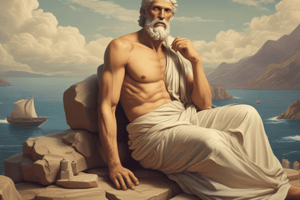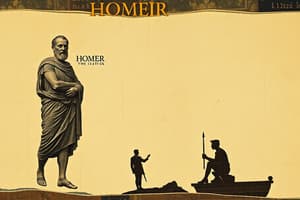Podcast
Questions and Answers
La ira de Aquiles es un tema central en La Ilíada.
La ira de Aquiles es un tema central en La Ilíada.
True (A)
Héctor es el rey griego en la historia.
Héctor es el rey griego en la historia.
False (B)
La belleza de Helena provoca el inicio de la guerra.
La belleza de Helena provoca el inicio de la guerra.
True (A)
Patroclo es el enemigo de Aquiles en la historia.
Patroclo es el enemigo de Aquiles en la historia.
El poema aborda temas como la gloria y el costo de la guerra.
El poema aborda temas como la gloria y el costo de la guerra.
La intervención de los dioses y diosas no influye en el curso de la guerra.
La intervención de los dioses y diosas no influye en el curso de la guerra.
Los epítetos son frases descriptivas que caracterizan a personas y lugares.
Los epítetos son frases descriptivas que caracterizan a personas y lugares.
El estilo homérico se caracteriza por un estilo rítmico típico de la poesía épica.
El estilo homérico se caracteriza por un estilo rítmico típico de la poesía épica.
La obra La Ilíada es un ejemplo tardío de la literatura occidental.
La obra La Ilíada es un ejemplo tardío de la literatura occidental.
Los catálogos se utilizan para enfatizar la escala de la acción en la narrativa.
Los catálogos se utilizan para enfatizar la escala de la acción en la narrativa.
Flashcards
Achilles
Achilles
Un guerrero griego legendario, cuyo enojo y retiro de la batalla impulsan gran parte de la acción en la Ilíada.
La ira de Aquiles
La ira de Aquiles
La furia de Aquiles y sus consecuencias devastadoras en ambos bandos de la guerra, ilustran el potencial destructivo de la ira y la soberbia.
Destino vs. Libre Albedrío
Destino vs. Libre Albedrío
La Ilíada explora la tensión entre los eventos predeterminados y las elecciones que hacen los individuos.
El costo de la guerra
El costo de la guerra
Signup and view all the flashcards
Gloria y Honor
Gloria y Honor
Signup and view all the flashcards
Intervención de los dioses
Intervención de los dioses
Signup and view all the flashcards
Comparaciones épicas
Comparaciones épicas
Signup and view all the flashcards
Epítetos
Epítetos
Signup and view all the flashcards
Estilo homérico
Estilo homérico
Signup and view all the flashcards
Importancia de La Ilíada
Importancia de La Ilíada
Signup and view all the flashcards
Study Notes
Overview of The Iliad
- Epic poem attributed to Homer, narrating a portion of the Trojan War.
- Focuses on the anger and consequences of Achilles, a legendary Greek warrior.
- Explores themes of glory, fate, heroism, and the cost of war.
- Presents a vivid depiction of the social and cultural values of the ancient Greeks.
Characters and their Roles
- Achilles: A powerful and proud warrior, central to the plot. His wrath and withdrawal from battle drive much of the action.
- Hector: The Trojan prince and greatest warrior, opposing Achilles in combat. Represents courage and loyalty to his city.
- Agamemnon: The Greek king, often viewed as arrogant and causing conflict through his actions.
- Priam: The Trojan king, embodies sorrow and vulnerability during the devastating conflict.
- Patroclus: Achilles' close friend, whose death ignites Achilles' rage and further escalates the war.
- Helen: The Greek beauty whose abduction is the spark that starts the war. Her actions are associated with the consequences of beauty and desire.
Narrative Arc
- The initial action unfolds around the anger of Achilles stemming from a dispute over a captured woman.
- It details the escalating conflict between the Achaean (Greek) and Trojan forces.
- The narrative follows the epic battles and the heroic deeds of both sides.
- The focus shifts to the death of Patroclus, triggering Achilles' return to battle.
- The sequence of events leads to the death of Hector and the culmination of the war's tragic consequences.
Key Themes
- Wrath and its consequences: The wrath of Achilles and its devastating effects on both sides illustrate the destructive potential of anger and pride.
- Fate vs. Free Will: The poem explores the tension between pre-ordained events and the choices individuals make.
- The Nature of War and its Costs: The brutal reality of war and the immense suffering it inflicts on the combatants and civilians are presented vividly.
- Honour and Glory: The importance of a warrior's reputation and the desire for glory are central motifs.
- Mortality and the Cycle of Violence: The poem demonstrates that even heroes are not immune to death and the cyclical nature of violence embedded within human societies.
- Hospitality and its breaches: The poem shows the importance of hospitality in ancient societies, contrasting this with the violation of this societal norm resulting from the war.
- The gods' intervention: The intervention of the gods and goddesses strongly influences the course of the war, illustrating their significant role in the narrative.
Literary Devices
- Epic similes: Extended comparisons used to paint vivid imagery and illustrate the scale and intensity of the epic events.
- Epistrophe: The repetition of words or phrases at the end of successive clauses, lines, or sentences.
- Epithets: Descriptive phrases used to characterize people and places, adding colour and flavour to the narrative.
- Use of catalogues: Detailed lists of people, places, or objects to emphasize the scale of the action and the epic scope of the narrative.
Structure and Style
- Homeric style: The poem features a specific rhythmic style of language, typical of epic poetry, which enhances the narrative flow.
- The use of epithets, and catalogues, and similes make the poem memorable and reinforce the emotional intensity
- The narrative is presented from a rather objective lens
Significance of The Iliad
- Offers invaluable insights into the social, cultural, and political realities of ancient Greece.
- Serves as an early example of Western literature, shaping subsequent narrative traditions.
- Remains a cornerstone of Western civilization, its influence seen in literature, art, and philosophy.
Studying That Suits You
Use AI to generate personalized quizzes and flashcards to suit your learning preferences.




